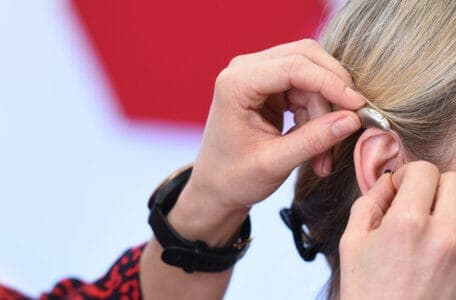What is tinnitus?
Tinnitus is the medical term for the perception of sound when no external sound is present. There are two types of tinnitus: Subjective or Objective. Subjective tinnitus is most common and can only be heard by the person with tinnitus. Objective tinnitus can be heard by the person with tinnitus and externally by others, but is quite rare
What is the link between tinnitus and isolation?
Tinnitus can feel very isolating; it’s not a visible illness and the tinnitus noise is unique to the person who hears it. Tinnitus noise can be buzzing, hissing, humming, whistling, clicking, chirping, roaring, “crickets” or beeping. Some people report their tinnitus changes pitch and/or volume on a routine basis. Tinnitus can occur in one, or both ears or in the head. It can be intermittent or it can constant.
This constant, potentially changing, noise can be energy-draining and can make you feel depressed; you don’t want to go out and it can affect your ability to work and function. But silence can also make the perception of tinnitus worse. It can be a vicious circle.
What causes tinnitus?
Some causes found to increase tinnitus include: loud noise, stress, alcohol, anxiety, nicotine, caffeine, high doses of some antibiotics, aspirin and recreational drugs.
The exact cause of tinnitus can often be hard to determine. Most commonly, tinnitus is associated with hearing loss. Some other underlying conditions reported to cause tinnitus include: Ménière’s disease, temporo-mandibular joint disorder (TMD) , barotrauma, ear infection, ear wax build-up, otosclerosis, acoustic neuroma, perforated eardrum, diabetes, allergies, hypertension, neurological disorders, metabolic disorders, and many more.
Some people have triggers that can cause fluctuations in the severity of their tinnitus. And some people have no recognisable cause for their tinnitus.
What treatments are available for tinnitus?
There is currently no cure for tinnitus. However, there are several effective tinnitus treatments, or combination of therapies, that can help reduce the severity and help provide relief over time. A few treatment options include: hearing instruments, sound therapy, masking devices, help with sleep, reducing stress/anxiety and cognitive behavioural therapy (CBT).
The main thing to remember is whilst tinnitus can feel isolating there IS help and support. Support groups are a wonderful tool that can connect you with other people living with tinnitus. The British Tinnitus Association has a link to area support groups (https://www.tinnitus.org.uk/find-a-support-group). Here you can find a group in your local area and what events they have planned.
angli-EAR Hearing & Tinnitus Solutions are here to help and have a passion for providing tinnitus solutions. We can assess if tinnitus is caused by any underlying treatable conditions or provide coping therapies to help your brain “tune-out” the noise to provide relief. Contact us today to experience the angli-EAR Hearing difference for yourselves.
Remember, everyone’s journey with tinnitus is different, but sometimes talking to someone else and hearing their story can be quite helpful.




